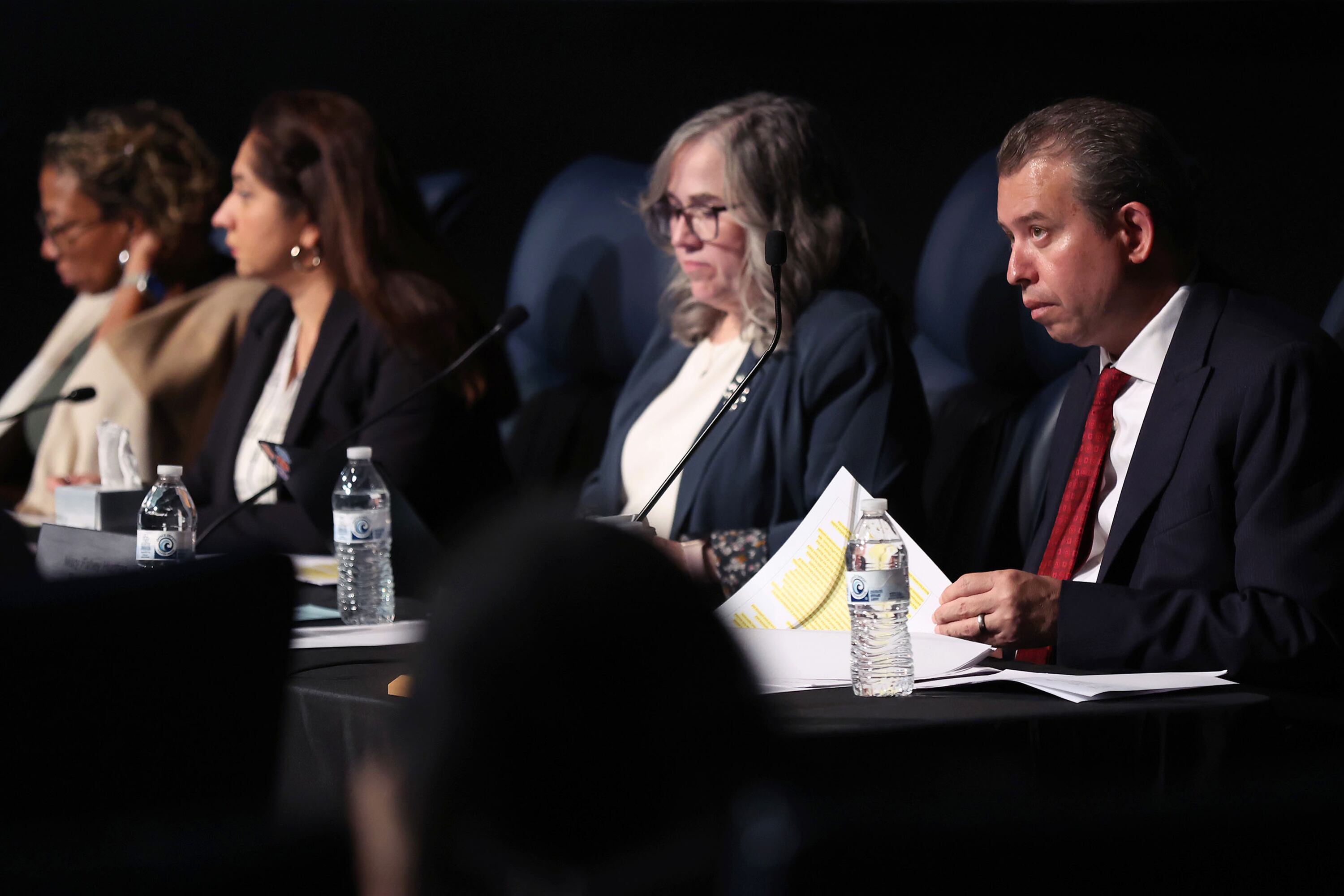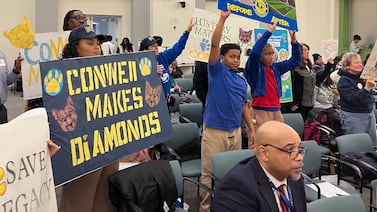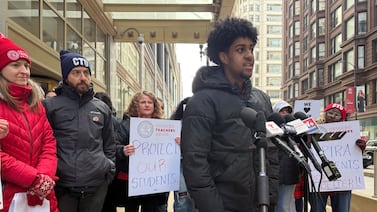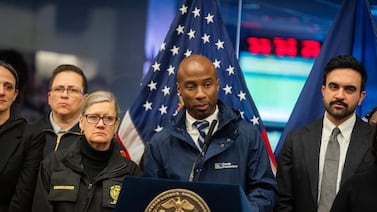Sign up for Chalkbeat Chicago’s free daily newsletter to keep up with the latest education news.
The Chicago Teachers Union this week stepped up pressure on Chicago Public Schools in contentious talks over a new contract — while district leaders countered they have made generous offers at a precarious financial time.
The union’s president, Stacy Davis Gates, this week sent a letter to Mayor Brandon Johnson, a close CTU ally, asking him to intervene because CEO Pedro Martinez “has slow-walked negotiations.” On Thursday evening, the union also held a rally downtown that drew a raucous standing-room-only crowd to decry Donald Trump’s reelection — and to argue that it adds extra urgency to wrapping up the contract talks, which began in April and continued as the current contract expired in June.
On a Thursday call with reporters, district officials argued that the two sides have made headway in the talks, though key areas of contention remain at a time when a major expansion of staff and other spending could imperil the already deficit-plagued district. CPS faces a half-billion dollar deficit next school year after its federal COVID aid runs out this year.
District officials said the union’s full slate of proposals would add $5.5 billion in some 13,000 additional staff positions and $3.7 billion in compensation increases over the four years of the contract.
Union officials cast doubt on those figures but declined to provide a more recent cost of their proposals, citing “fluid” ongoing negotiations.
“We are not still at our initial proposal at this stage of bargaining, so I think what they’re trying to do is a PR ploy to improve their bargaining position and try to put the least amount of money that they possibly can into investing in schools and school communities,” Thad Goodchild, deputy general counsel for the union, told Chalkbeat.
The bargaining over a new contract was at the heart of a major clash between Martinez and Johnson, which has led to months of CPS turmoil — and might yet cost the CEO his job.
The schools chief and mayor have disagreed over how to pay for the cost of the contract amid a darkening financial outlook for the district, which is spending down the last of its federal COVID dollars and has no clear prospects for added revenue. The union has put forth its most far-reaching and costliest slate of hundreds of proposals yet — one it has presented as a blueprint for a major district transformation.
“Our students are making tremendous progress,” said Bogdana Chkoumbova, the district’s chief education officer. “Our focus has been on how we can sustain and build on this progress in a challenging budget environment.”
But, she added, “The gap between the CTU’s proposals and our financial situation is significant.”
District touts its compensation offer to teachers
The district and union are bringing in a neutral fact-finding expert to evaluate the district’s financial situation and impact of proposals; a report is expected in early January, but it will only be made public if one or both sides reject its findings.
The union, which until this spring had portrayed Martinez as someone ushering in a new, more collaborative era in labor relations, has soured on the CEO since contract talks began in earnest this summer. The CTU has turned into a relentless critic openly calling for Martinez’ ouster.
In her letter to Johnson, Davis Gates said the union, the mayor, and a school board he appointed in October agree on a direction for the district. The current board was installed after the entire previous board of mostly Johnson appointees resigned under pressure to fire Martinez. (The board’s new president quit shortly afterward after antisemitic and misogynistic social media posts came under scrutiny.)
“We are now at a critical juncture that requires your intervention to ensure that the Board of Education enshrines the commitments to transform public education that the people of the city of Chicago elected you to carry out,” she wrote.
Bridget Early, the deputy mayor for labor relations, who has attended the talks since the spring, told Chalkbeat she can see her office playing a more active role, which she said Martinez had requested earlier this fall as well. She said she would like to see the two sides start to meet “all day, every day” to speed up progress.
Early said they are close on key issues such as expanding the Sustainable Community Schools program, which gives some high-needs campuses extra funding to team up with nonprofits on beefing up after-school and other programs.
The union on Monday presented a new “roadmap” with revised proposals reflecting priorities such as preparation time for elementary teachers, Early said. “It felt disingenuous for the district today to continue to perpetuate that the contract will cost $10 billion.”
Goodchild said on Thursday that CPS has provided a “decent number of proposals over the course of this week,” but described it as “really incremental progress … at this stage of the game.”
In her letter, Davis Gates said the union’s proposals include codifying protections for LGBT students and staff, special education students, and English learners. She said all would be especially relevant following Trump’s election.
The letter was a rare instance of the union calling on Johnson, a former CTU organizer who got elected with help from the union, to step in. That’s a major shift from negotiations under his predecessors, Rahm Emanuel and Lori Lightfoot, when the CTU argued mayors drive the process and must take responsibility for slow progress.
The district has said it has already made a generous compensation offer at the bargaining table, but no agreement on pay has been reached: Teachers would receive raises of up to 5% a year — or as much as 8% when increases for experience and added education are factored in — during the four years of the contract.
CPS officials said for a typical CPS educator — someone with about a decade of experience and a master’s degree — that offer would bring the salary to about $125,000 by 2029. They would also get health care and other benefit increases at no cost to them. Overall, the district said, its offer will cost $1.3 billion over the next four years.
A regular CPS teacher now makes a median salary of about $95,000 a year. District officials said this compensation is the second-highest among large districts across the country and compares to a median salary of $78,000 for suburban Cook County teachers.
“We are proud of our record on teacher compensation,” said Ben Felton, the district’s chief talent officer. “We are not trying to nickel-and-dime our teachers here.”
Goodchild said the district’s initial salary proposal was “serious,” but it does not account for inflation and rising cost of living that was missed during previous contracts.
Union seeks more headway on staffing, class sizes
The district has also agreed to lower class sizes in kindergarten and grades 4 through 8, pay for at least three arts, physical education, STEM, or world language teachers at each school, and offer more professional development. It would also hire additional counselors and case managers at some schools.
But the 330,000-student district has resisted other proposals to grow staffing. Its payroll has grown by roughly 7,000 full-time positions since 2019, to about 46,000 positions, according to district data — an expansion that has contributed to the addition of roughly $1 billion to the district’s almost $10 billion annual budget.
“The headwinds we are facing financially are really significant,” said Mike Sitkowski, the district’s budget chief, cautioning that union proposals would drive the district’s deficit to $4 billion by 2029.
District officials also signaled they have pushed back on some union proposals that do not necessarily carry a price tag but would infringe on principals’ flexibility to lead their campuses or — in the case of a proposal to increase elementary teacher prep time — could decrease instructional time for students.
Goodchild called the criticism “myopic,” and said the union’s proposal around prep time is broader than how the district is presenting it: It is meant to provide more enrichment to students, such as art and music, which the union said would allow more prep time for teachers.
Goodchild said the district and the union are also far apart on proposals around beefing up bilingual staff and making schools more energy efficient, such as through adding solar panels.
In its original package of proposals, the union had asked for 9% annual raises, smaller class sizes, more environmentally-friendly school building, housing assistance for homeless students, cash for transportation and mental health services for migrant students, a librarian in every school, in-home counseling for students who experience trauma, and more.
In a letter to members this week, the union listed as top priorities proposals to build more prep time for teachers into the elementary school day, hire more librarians and expand sports and other programs, secure enforceable class size limits, and a “salary and benefit bump that adequately addresses veteran educators and inflation.”
It said intense pressure on Martinez, including a September vote of no confidence in him by its governing body, has helped spur movement at the bargaining table.
Asked how a potential ouster of Martinez would affect the ongoing negotiations, district officials said they would stay the course.
“This is not about CEO Martinez; this contract is consequential for our educators and our students,” Chkoumbova said. “The sooner the better — we’re not dragging our feet.”
CTU rally highlights union demands
Thursday’s CTU rally, held at a downtown church, drew hundreds of people, many of them dressed in bright red CTU shirts and sweatshirts. Audience members at one point rose to their feet, waving signs with some of the union’s biggest demands, such as “A library with a librarian in every school,” and “Smaller Class Sizes.”
Jenny Carrasco, 17, a senior at Back of the Yards College Prep, sat with friends in a pew holding a sign that said “Green Schools Resilient Communities.” Carrasco said a CTU member invited her and other students involved with the Sunrise Movement, an organization focused on addressing climate change.
Carrasco wants to see more green-friendly schools, such as using more energy efficient practices in buildings and adding more solar panels and more air conditioners to her school, which has often felt too humid.
“We need a healthy environment,” she said.
At one point, the union’s deputy legislative director Hilario Dominguez led a chant to the tune of the song, “Bad Boys (Watchu Gonna Do)”: “Pedro and Trump, Watchu gonna do? You don’t want no problems with the CTU.”
Mila Koumpilova is Chalkbeat Chicago’s senior reporter covering Chicago Public Schools. Contact Mila at mkoumpilova@chalkbeat.org.






